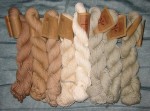Wear Organic Cotton: We Eat Organic Food, Let’s Select Organic Clothing More Often!
Do you have anything in your closet made from organic cotton? At this writing, I have exactly one thing, a nightgown. My husband Kelly is ahead of me, with four organic cotton t-shirts. We regularly buy organic produce at supermarkets and farmers’ markets, but it isn’t nearly as easy to go organic when buying clothing.
The availability of organic cotton clothing is mostly online, though some large retailers, including Wal-Mart, are beginning to carry it in retail stores. Since people like to try on clothing before buying it, it sells better when we can just go into a store and see if it fits!
You are definitely helping the planet when you choose organic cotton clothing. Conventionally grown cotton is a crop using extremely heavy applications of pesticides; in fact, over 10% of all pesticides used worldwide are applied to cotton. At present, only a very tiny fraction of cotton is grown organically. So-called natural cotton is usually an intermediate between organic and conventional. When you buy an organic garment, you are helping to create consumer demand for more ecological farming methods.
Happily, organic cotton clothing is often competitively priced, and it is widely available online. Those t-shirts of my husband’s came from Cafepress.com, a website where you can upload your own art work and put it on clothing, mugs, and other items. Most of Kelly’s t-shirts sport his own photography. Like many of the websites where you will find organic choices, they are among the conventionally grown choices and you have to watch for them.
There are also a growing number of websites that only sell organic clothing, and many of those also pay attention to the quality of the dyes used and the working conditions of the people who sell the clothing. You can find a lot of these websites by going to your favorite search engine and typing in “organic cotton” or “organic clothing.”
One of the most ecological things you can do with your wardrobe is to go easy on the number of purchases you make. Even buying eco-friendly clothing has an environmental cost, from the manufacture to the shipping. Also, check your local recycled clothing stores and yard sales, because you will often find attractive, nearly new items in your size at such places.
Organic cotton is not the only eco-friendly fabric. Hemp, bamboo, silk, and other fabrics are being grown organically more and more. It’s probably only a matter of time until wearing organic clothing is as common as eating organic food. With our help, that time can come sooner.

